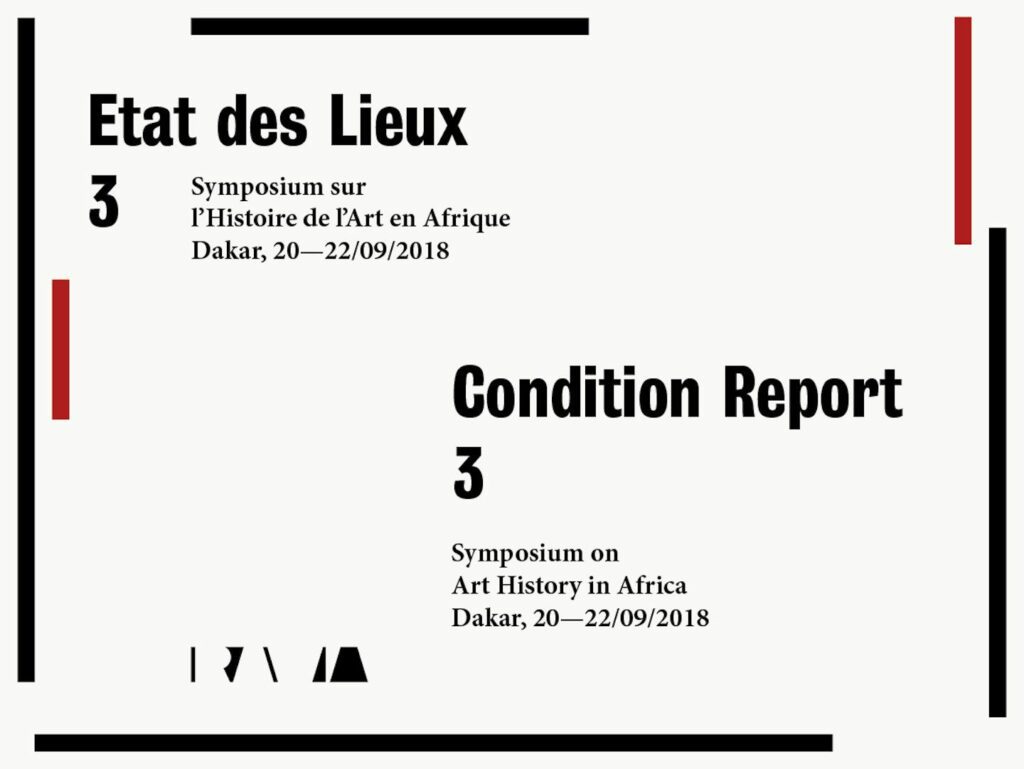RAW Material Company , Dakar, Senegal
20 Sep 2018 - 22 Sep 2018

RAW Material Company announces its upcoming symposium Condition Report 3 on Art History in Africa, convened in collaboration with critic, curator and art historian Ugochukwu-Smooth Nzewi, taking place in Dakar from September 20–22, 2018.
After a first Condition Report on building art institutions in Africa (2012) and a second on artistic education in Africa (2014), RAW Material Company is now turning its attention to the discipline of art history as a lens to critically examine the politics and potential of knowledge production around contemporary African artistic practice.
As we near the end of this second decade of the new millennium, we also move further away from a decisive turning point in the conception, distribution and reception of African art, that is to say the end of the 1980s, a moment when the artistic scene witnessed the appearance of a plethora of initiatives engaging with contemporary African art. This period was simultaneously marked by the geopolitical reconfiguration that was the end of the Cold War, and in turn by a rupture with dominant cultural and social paradigms. While the exhibition Magiciens de la terre is cited as the reference point of a global turn in art history; more specifically, the creation of Revue Noire, Nka Journal of Contemporary African Art and the Dakar biennial are other notable temporal markers that bring us to the beginning of the 1990s, a moment at which numerous initiatives served to restructure the axes of artistic perspectives and led to an increased interest in the African creative scene, notably in the domain of art history. Thirty years on, the time has come to take stock of what today constitutes the discipline of art history in Africa with a focus on the contemporary. Taking this temporal foundation as a point of departure, this opens up an extremely rich and vast conceptual and material constellation.(1)
On the African continent there are a number of art history departments, but they are still few and far between, small in terms of material and human resources particularly relative to the demographic power of the continent’s 54 countries and often subsumed as modules of study under larger fine art courses. Moreover, it is important to remember the acute economic pressure in Africa that is pushing large numbers of young students to move into academic fields that seem more lucrative in the short term. This disciplinary exodus gravely threatens the future of art history and is impacting negatively on the production and critical analysis of artistic production by African artists, affecting the well-being of art and society in general. While more and more examples of hybrid forms emerging from the mix of art history, curatorial studies and arts administration are integrated into just as hybrid curricula hosted in the wide spectrum of « humanities, » it is fundamental to consider whether this approach is sufficient. Is it enough to make room for examples of African art in the grand chronologies of academia or shouldn’t we rather encourage a complete reconstruction of existing art histories?
A number of profound historiographical questions will underpin paper presentations, panels and site visits across Dakar: To what extent does Africa have a say in the way it is produced and consumed? To what extent are the nuances of Africa as a thriving territory conveyed in the knowledge produced about the continent that serve interests elsewhere, be it for academic promotion or intellectual legitimation? And what strategies and methodologies exist that are countering and rebelling against the dominance of a Western academic status quo?
These questions will be explored by a multi-disciplinary panel of art historians, artists, curators, critics and collectives whose innovative practice is reshaping the perceived parameters of the discipline. The keynote will be given by Salah Hassan and speakers will include Elvira Dyangani Ose, Ntone Edjabe, Elizabeth Giorgis, Paul Goodwin, Nana Oforiatta Ayim, Sean O’Toole, Bisi Silva, Bonaventure Soh Bejeng Ndikung and Suzanna Souza.
The symposium is open to the public and free of charge. A limited number of public spaces will be available. RVSP to info@rawmaterialcompany.org by September 3, 2018.
International attendees are advised to arrange their travel to Senegal independently. We invite you to sign up to our newsletter via our website and follow us on social media for continuous updates.
RAW MATERIAL COMPANY
Villa 2b ZONE B
BP 22170 Dakar
Senegal
(1) The term constellation is borrowed from the text “The Postcolonial Constellation: Contemporary Art in a State of Permanent Transition” by Okwui Enwezor, which appeared in Fault Lines: Contemporary African Art and Shifting Landscapes the publication drawn from the eponymous exhibition which took place during the 50th edition of the Venice Biennale, 2003.